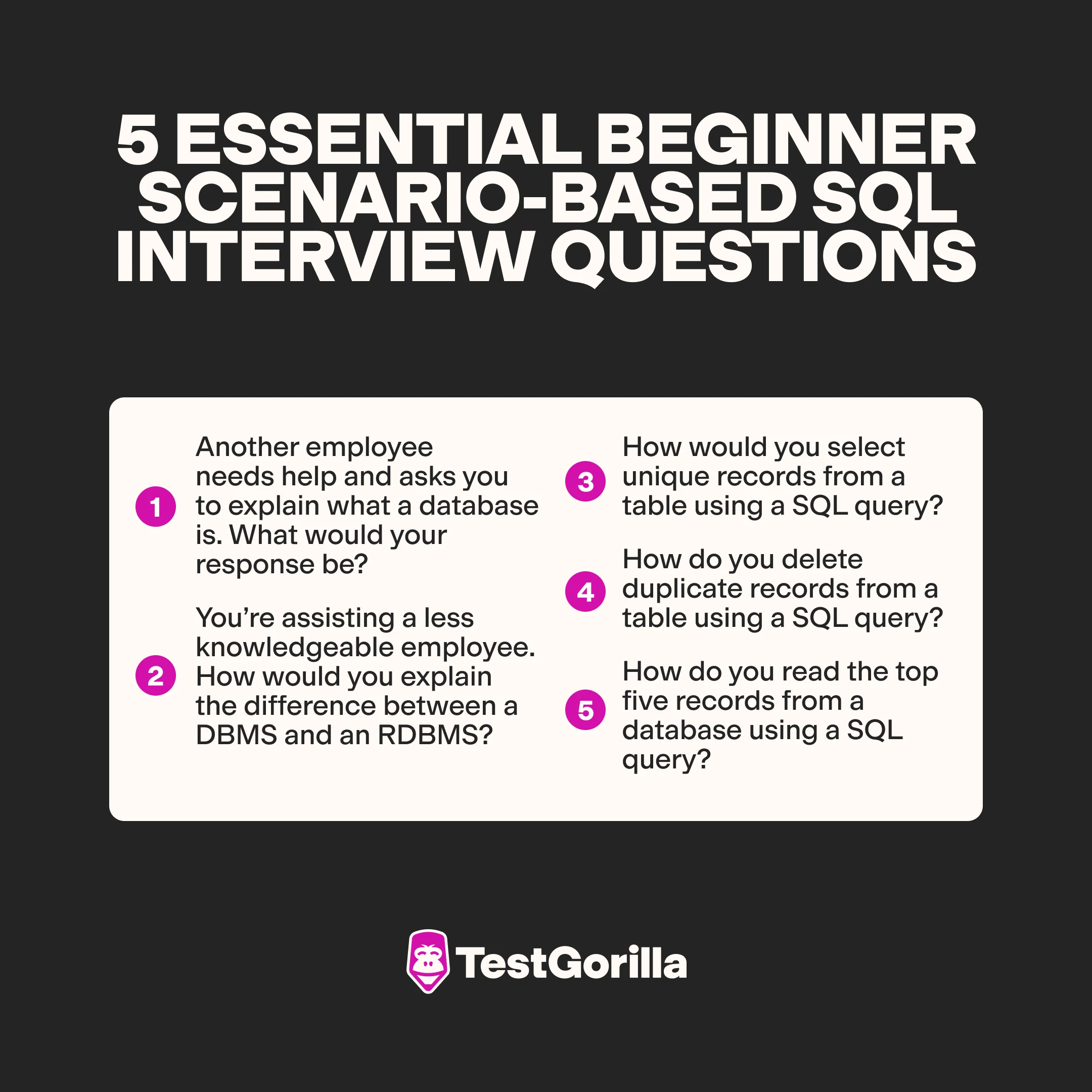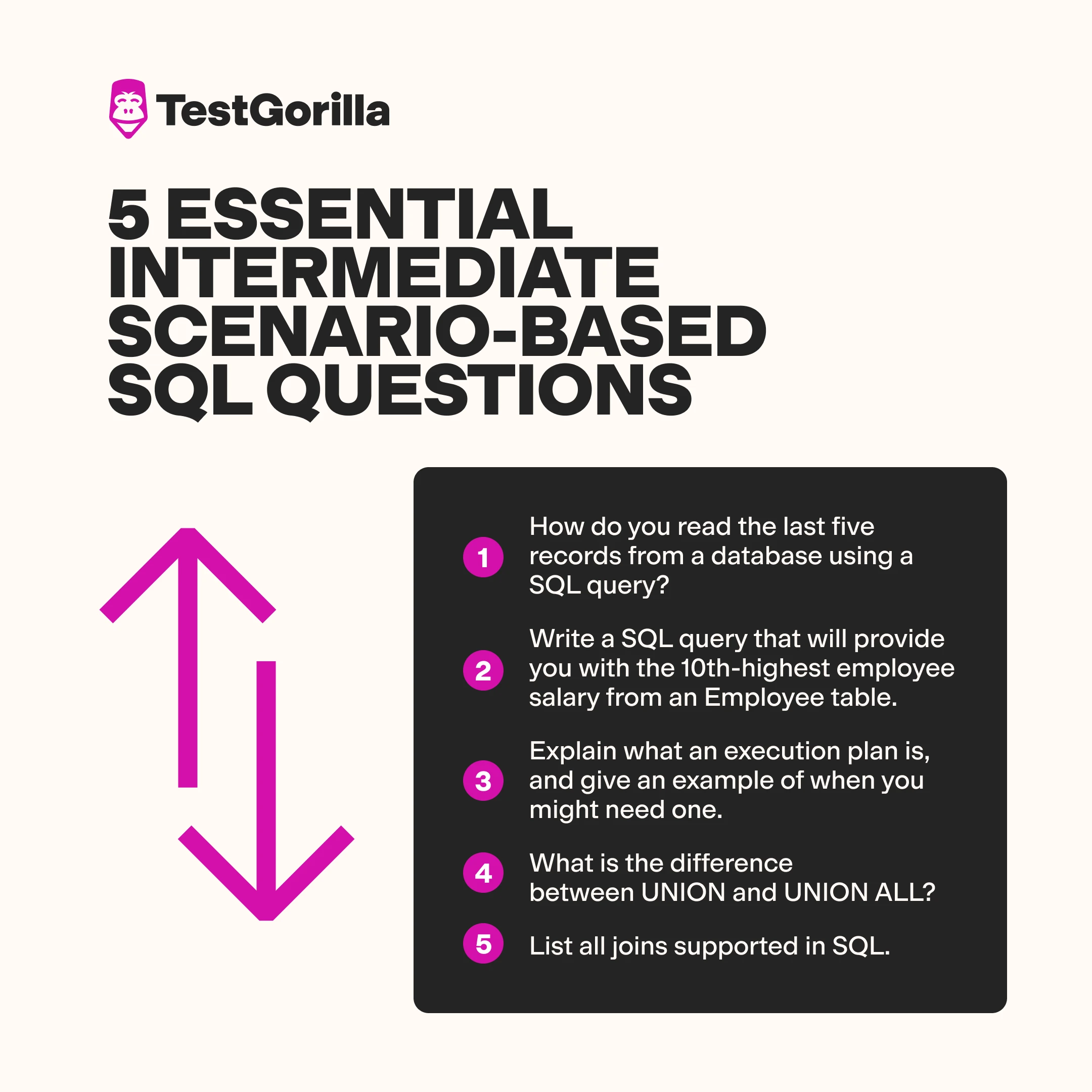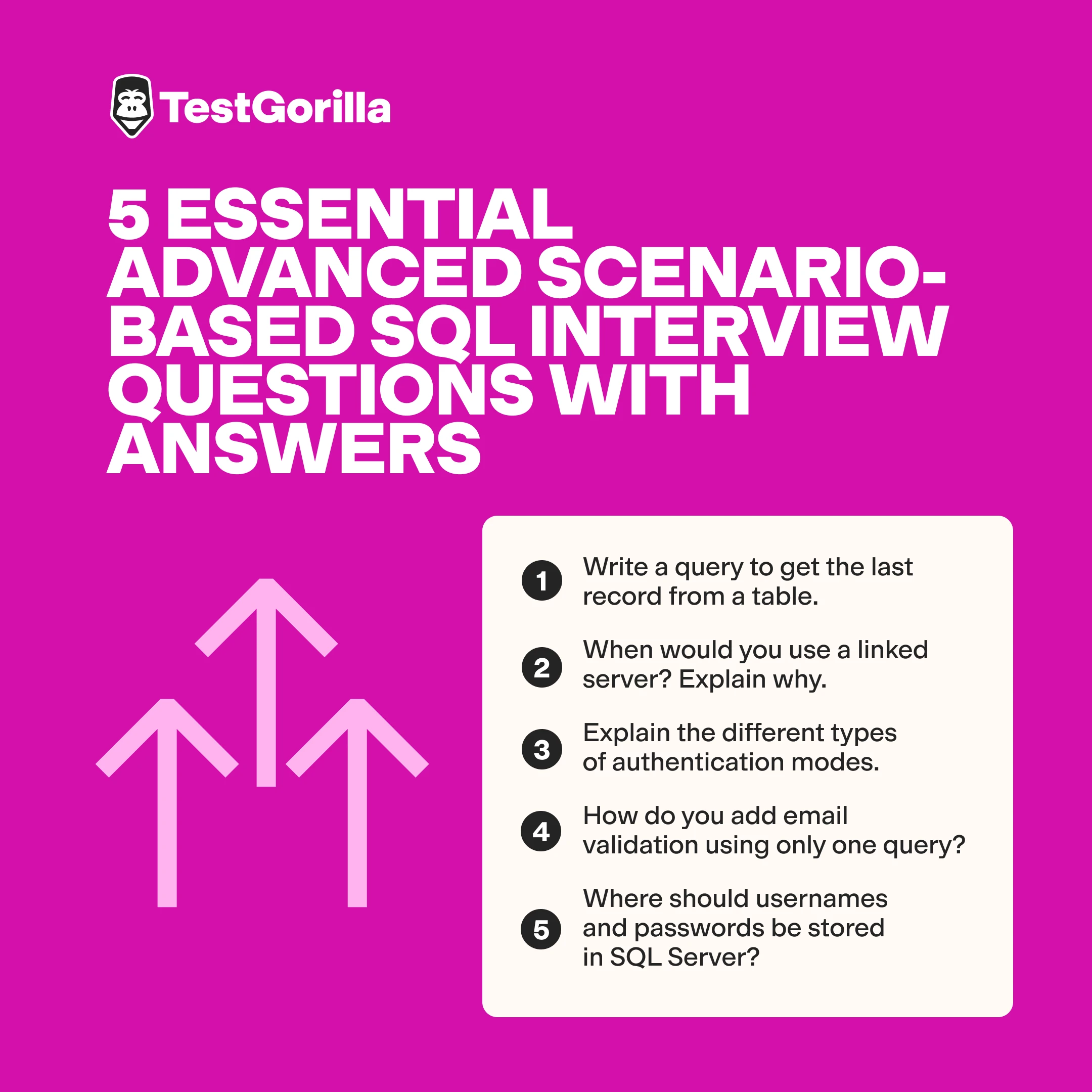40+ scenario-based SQL interview questions to ask programmers
Find the most skilled SQL developers using TestGorilla
Structured Query Language (SQL) is a programming language used to manage the data in a relational database. When you hire programming professionals who work with this language, you need to know they are proficient in SQL and meet your role’s requirements.
Though you can use aptitude assessments to evaluate your candidates’ skills, you still need to get to know them in person and confirm that they can think on their feet and solve problems quickly.
We have created this list of more than 40 scenario-based SQL interview questions to help you gauge your candidates’ understanding of SQL. Use these questions to find the most skilled SQL developer.
Table of contents
- 30 beginner scenario-based SQL interview questions
- 5 essential beginner scenario-based SQL interview questions with answers
- 10 intermediate scenario-based SQL questions
- 5 essential intermediate scenario-based SQL questions with answers
- 8 advanced scenario-based SQL interview questions
- 5 essential advanced scenario-based SQL interview questions with answers
- Which roles can you ask scenario-based SQL interview questions for?
- When should you ask scenario-based SQL interview questions during the hiring process?
- Make your list of scenario-based SQL questions to assess your candidates
30 beginner scenario-based SQL interview questions
Rather than making the interview feel like an hour-long exam, it’s better to have some quick-fire questions ready to ask your candidates. Ask applicants some of these 30 scenario-based questions to quickly learn about their knowledge and abilities.
How would you convert seconds into time format?
How would you display the number of weekends in the current month?
How would you display the common records in two tables that can’t be joined?
What query would you use to display the third-last record in a table?
How would you display a date in the format DD-MM-YYYY?
What query would you use to drop all user tables from Oracle?
How would you view the month-wise maximum salary for a specific department?
What query would give you the second-highest salary in an employee table?
How would you get a list of all employees and their managers?
How would you find the previous month’s last day with a query?
How would you gather the admission date of a student in Year-Day-Date format?
What query would you use to create a new table with the Student table structure?
How do you view only common records from two different tables?
How do you view employees’ monthly salaries based on their annual salaries?
If a Student table holds comma-separated values, how would you view the number of values?
How would you retrieve employee information when the employee has not been assigned to a department?
How would you use the rank function to display the third-highest salary?
How would you display all employees with a salary greater than $30,000 who joined in 2019?
How would you display a string vertically?
How would you display the first 25% of records from a Student table?
How would you display the last 25% of records from a Student table?
How would you convert the system time into seconds?
What query would you use to show numbers between 1 and 100?
How would you show the DDL of a table?
How would you show only the odd rows in a Student table?
Another employee needs help and asks you to explain what a database is. What would your response be?
You’re assisting a less knowledgeable employee. How would you explain the difference between a DBMS and an RDBMS?
How would you select unique records from a table using a SQL query?
How do you delete duplicate records from a table using a SQL query?
How do you read the top five records from a database using a SQL query?
To ensure you have enough questions for your interview, choose between 5 and 15 of the questions listed above. Though you may be unable to ask all of them, it’s better to have too many than too few.
5 essential beginner scenario-based SQL interview questions with answers
To review your applicants’ responses, use these straightforward sample answers to our scenario-based SQL interview questions.
1. Another employee needs help and asks you to explain what a database is. What would your response be?
Often, companies have departments and teams made up of employees with different skill sets and knowledge. Teams that communicate effectively have up to 25% higher productivity. This is why you need programmers who can provide support for employees who are less knowledgeable when it comes to the technical aspects of the business.
If an employee from one department needs assistance with managing a database, it would be helpful for them to understand what a database is.
The ideal candidate should explain that a database is a collection of structured data that can be accessed, retrieved, managed, and stored in a digitized computer system. Databases are built with a design and modeling approach and can be stored on a file system, a computer cluster, or cloud storage, depending on their size.
The more straightforward and easy to understand their answer is, the better your candidate will be at communicating with less knowledgeable employees about databases.
2. You’re assisting a less knowledgeable employee. How would you explain the difference between a DBMS and an RDBMS?
You need to know that your candidate can explain complex SQL topics to a less knowledgeable person. When you ask this question, ensure the employee answers in layperson’s terms using clear language.
They should be able to explain that a DBMS is a database management system, a system that enables professionals to manage databases and retrieve information from them. It structures and organizes data to make it easily accessible. A DBMS only allows the user to access one data element at a time.
An RDBMS, on the other hand, stores data in a table structure, helping professionals access multiple data elements more efficiently.
3. How would you select unique records from a table using a SQL query?
This is a practical question relating to SQL that your ideal candidate will be able to answer quickly. Your interviewee might provide a couple of acceptable answers:
You can use the GROUP BY and SELECT clauses to collect data from multiple records and group them by columns. Using the GROUP BY function enables you to view unique records from your selected columns and query them.
You can use the ROW_NUMBER() function to assign consecutive numbering to the rows in your result. This way, you can assign row numbers to your unique records for your query.
Asking this question will help you learn if candidates can clearly convey technical information and understand SQL queries.
4. How do you delete duplicate records from a table using a SQL query?
Streamlining your database and reducing duplicate data can help you free up storage space and improve efficiency by speeding up data retrieval. If your database is filled with duplicate records, this could impact your computer processing speed and cloud storage space.
Your candidate should know how to perform the basic task of deleting duplicate records from a table using a SQL query.
One method is using the GROUP BY and HAVING clauses to retrieve duplicate records. You could then create a temporary table or subquery to store the duplicate records. Finally, you can use the DELETE statement to delete the duplicate records from the original table.
Take note of candidates who provide multiple answers and describe when they would use each solution. Those who offer more information may be more conscientious and have strong problem-solving skills.
5. How do you read the top five records from a database using a SQL query?
Your ideal candidate should be able to easily retrieve the top five records in a database. Pay attention to applicants who can quickly answer this question.
They should mention that the ROWNUM function enables them to allocate a pseudocolumn to the results, providing a number order. From there, they can select the top five results using a SQL query.
The best insights on HR and recruitment, delivered to your inbox.
Biweekly updates. No spam. Unsubscribe any time.
10 intermediate scenario-based SQL questions
Here are some intermediate scenario-based SQL questions to ask once your candidate is comfortable and settled into the interview.
How do you read the last five records from a database using a SQL query?
Write a SQL query that will provide you with the 10th-highest employee salary from an Employee table.
Explain what an execution plan is, and give an example of when you need one.
What is the difference between UNION and UNION ALL?
List all joins supported in SQL.
Find the fourth-highest score from a Student table using self-join.
Show the number of employees who joined in the past three years.
Select all records from the Student table, excluding X and Y.
Get the DDL of a table.
How would you show the Nth record in the Student table?
5 essential intermediate scenario-based SQL questions with answers
To help you analyze your candidate’s answers correctly, here are some of the most important intermediate-level SQL questions with answers.
1. How do you read the last five records from a database using a SQL query?
Your candidate’s answer to this question should be similar to the one for the question above. However, they must also mention that using the minus factor to ensure the result only pulls the last five records and not the first five.
2. Write a SQL query that will provide you with the 10th-highest employee salary from an Employee table.
Presenting your candidate with a task like this during the interview will give you an idea of their working speed, which directly affects their productivity. You can closely observe how quickly they can develop a SQL query and test the query to see if it works.
You should also ask candidates to explain their answer. Their response will help you understand their reasoning and why they wrote the query using this method and not another.
3. Explain what an execution plan is, and give an example of when you might need one.
An execution plan is a guide that dictates the data retrieval methods selected by the server’s query optimizer. It is useful in helping a SQL professional analyze the efficiency of stored procedures. The execution plan enables the programming professional to better understand their query procedures to optimize query performance.
4. What is the difference between UNION and UNION ALL?
UNION and UNION ALL are SQL operators that your programmer should be able to distinguish between. They should explain that UNION combines multiple datasets into one, removing any duplicate rows from the combined result set.
UNION ALL performs the same function, except it does not delete duplicate records. So, if you wish to keep all records without deleting duplicates, you should use UNION ALL instead of UNION.
5. List all joins supported in SQL.
Your candidate should know which joins are supported in SQL. They should be able to list all of the joins supported, which are:
INNER JOIN
LEFT JOIN
RIGHT JOIN
FULL JOIN
CROSS JOIN
The candidate should be able to explain what each join does. Ask them to provide examples of when they would use each join to gauge their level of practical knowledge and experience.
8 advanced scenario-based SQL interview questions
Here are some advanced scenario-based SQL interview questions to challenge your candidates and help you apply some pressure.
Write a query to get the last record from a table.
When would you use a linked server? Explain why.
Explain the different types of authentication modes.
How do you add email validation using only one query?
Where should usernames and passwords be stored in a SQL server?
What do you do when you cannot find the correct query?
Which questions did you find the hardest? Explain why.
Do you have any other relevant programming knowledge we should know of?
5 essential advanced scenario-based SQL interview questions with answers
To challenge your candidate’s knowledge during the interview, ask a few questions they may be unable to answer. Evaluate their responses against the five sample answers to these SQL interview questions.
1. Write a query to get the last record from a table.
For this question, it’s best to provide the candidate with an example table for which they can write and test a query.
2. When would you use a linked server? Explain why.
Of course, your candidate should understand how to write SQL queries. But they also require strategic knowledge that informs their decision-making. Candidates need to know that professionals use linked servers to link to a remote database.
Asking them when they should use a linked server will help you learn whether the candidate has practical experience, not just knowledge of writing SQL queries.
3. Explain the different types of authentication modes.
Your SQL professional should be able to describe the different types of authentication modes to you. They may explain that SQL servers support two primary authentication modes: Windows authentication mode and mixed mode.
Ask follow-up questions to check if your applicants have experience using these modes and can explain what each does. They should know that Windows authentication disables SQL server authentication and that mixed mode enables both of these modes.
4. How do you add email validation using only one query?
In their response, your candidate should specify which RDBMS the query is compatible with. For instance, they should state that they would use the query PATINDEX(‘%[^a-z,0-9,@,.,_]%’, REPLACE(email, ‘-‘, ‘a’)) = 0;, which would be compatible with Microsoft SQL Server.
5. Where should usernames and passwords be stored in SQL Server?
Ask the candidate to explain that the usernames and passwords in a SQL server are stored in the master database in the sysxlogins table. They should also explain that passwords are stored in a hashed format rather than plaintext to enhance security.
Which roles can you ask scenario-based SQL interview questions for?
To help you understand whether you’ll need SQL interview questions for the position you’re hiring for, here are some examples of roles that require SQL knowledge:
Business analyst/business intelligence developer
Software developer/engineer
Database architect
If you’re hiring for any of the above positions, you’ll need candidates proficient in SQL and query creation. Even if a candidate doesn’t have official experience with SQL, they may have knowledge that you can test using a skills assessment and interview.
Start building your SQL skills assessment and hire candidates who are a good fit.
When should you ask scenario-based SQL interview questions during the hiring process?
If you’re hiring SQL professionals, you must devise an effective hiring strategy. On average, a job opening attracts 250 resumes. That’s why you need a more effective screening method than reviewing resumes manually. Fortunately, a skills assessment can completely replace resume screening.
Before you ask your candidates any scenario-based SQL questions, use skills assessments to create a shortlist of candidates to invite for an interview.
You can build a SQL skills assessment that suits your SQL role by choosing from our SQLite (Coding): Entry-Level Database Operations test, SQLite (Coding): Intermediate-Level Querying test, and other relevant tests.
You can rank applicants from most to least skilled based on their test scores. Invite the best candidates to an interview after receiving their results, and ask questions about their personality, career, and education. From there, you can begin testing their knowledge with scenario-based SQL interview questions.
Make your list of scenario-based SQL questions to assess your candidates
Any position that requires the management or use of databases needs a candidate skilled in SQL. However, experience and training don’t always translate to the ability to use the language practically.
This is why using skills assessments and asking the right scenario-based SQL questions during the interview is essential to putting your candidate to the test.
At TestGorilla, we have a range of skills tests you can choose from to find the right candidate for your position. Learn more about how TestGorilla’s platform works with a free 30-minute session with our team.
You've scrolled this far
Why not try TestGorilla for free, and see what happens when you put skills first.























